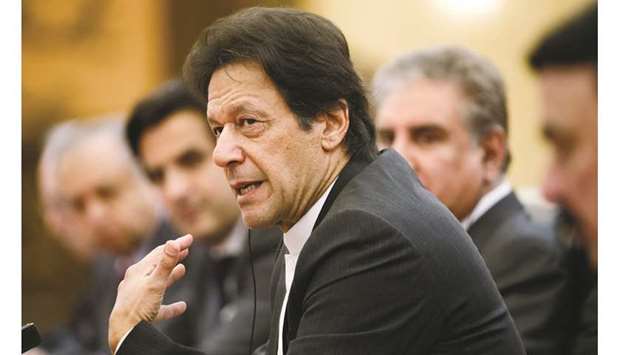Prime Minister Imran Khan has directed government officials to ensure that an open door policy is implemented and that people are not made to wait for hours because of official meetings.
The premier met members of the National Assembly (MNAs) from Sargodha Division in Islamabad and was briefed about issues faced by citizens.
Speaking to the lawmakers, Khan said: “It is the Pakistan Tehreek-e-Insaf (PTI) government’s top agenda to depoliticise bureaucracy and ensure provision of public services.”
“Attempts by government officials to create difficulties for the public are unacceptable,” he added.
The prime minister directed the MNAs to identify those involved in corruption, bribery, and nepotism.
“The appointed representatives should play an active role in ensuring that problems faced by citizens are identified and resolved,” Khan added.
“Government officials must implement an open door policy for the public and should end the practice of keeping people waiting in the pretext of official meetings,” the prime minister stressed.
“A comprehensive programme for the assistance of the poor segments of the society will be announced soon. Skill development of the youth and development of agriculture is among the top priorities of the government,” Khan said.
Meanwhile in Punjab’s Rajanpur, where the prime minister was attending a ceremony to inaugurate the Insaf health cards, he said that during Nawaz Sharif’s three stints as prime minister, his medical treatment cost the nation Rs280mn.
Punjab Health Minister Yasmeen Rashid was also present at the ceremony.
The Insaf health card is her initiative.
The government will provide the Insaf health cards to the underprivileged families.
The prime minister said that the government hospitals used to provide better healthcare, but the politicians prefer to have their treatment abroad.
“I was born in a government hospital, my sisters were too. In the past, these hospitals used to provide standard healthcare,” Khan said.
He lamented that the law is applied differently for the poor and rich. “We will hold each and every one accountable.”
The prime minister said that he has envisioned a Pakistan where the poor and the highest officials will get the same type of medical treatment at a government hospital.
Khan also chaired a central cabinet meeting in Islamabad, during which it was revealed that the Prime Minister’s Office had taken lead in cutting down its expenditure by 31% during the current financial year, resulting in savings of Rs303mn.
“The savings have been made under various headings, including pay and allowances, food expenses, motor vehicle fuel, and cash rewards,” said an official statement issued to media after the meeting.
According to the statement, Prime Minister Khan reiterated his call for a maximum possible cut in expenditure, and urged all the ministers to ensure that the PTI government’s austerity drive is implemented in letter and spirit.
It was decided that in future a high-level committee would propose a panel of suitable officers for posting against the slot of a secretary of a ministry.
The committee would be headed by adviser to the prime minister on establishment, and include Minister for Education Shafqat Mehmood, the concerned minister-in-charge, the establishment secretary, and the secretary to prime minister
It was decided that normal tenure on the post would be two years and continuation of tenure will be subject to review by the minister-in-charge after the initial six months.
It was also decided that normal tenure of two years could be extended to three years on the basis of a performance review by the prime minister in consultation with the minister-in-charge.
The cabinet also granted ex-post facto approval of a memorandum of understanding (MoU) on industrial co-operation between the China’s National Development and Reform Commission and the Pakistan’s Federal Board of Investment.
It ratified the decision taken by the Cabinet Committee on State Owned Enterprises (CCoSOEs) at its meeting held earlier this year.
The cabinet granted ex post facto approval to appointments of administrator and deputy administrators in the Abandoned Properties Organisation.
The cabinet approved the appointment of Azhar Hameed as the Employees Old Age Benefits Institution (EOBI) chairman.
It also approved an MoU between China’s Yunnan Minzu University (YMU) and the National University of Modern Languages (NUML).
The cabinet gave the nod to a proposal to appoint M/S Horwath Hussain Chaudhry and Co to audit the accounts of the National Database Registration Authority (NADRA) for the financial year 2017-18.
The cabinet ratified the Visa Abolition Agreement between Pakistan and Cyprus for diplomatic and official/service passport holders.
It approved the appointment of Raja Amer Khan as chairman of the Implementation Tribunal for Newspaper Employees (ITNE).
The cabinet approved the appointment of Justice Shahid Karim as a judge and Justice Tahira Safdar as president of a special court, constituted under Criminal Law Amendment (Special Court) Act 1976.
The cabinet also approved the composition of a steering committee for the Sustainable Development Goals Achievement Programme.
It approved the MoU between Pakistan and China Overseas Ports Holdings Company under the Clean Green Pakistan Movement (CGP-M).

Prime Minister Khan: Attempts by government officials to create difficulties for the public are unacceptable.
